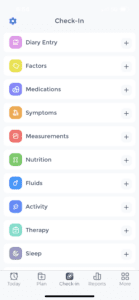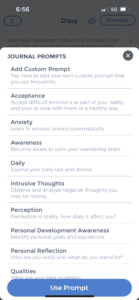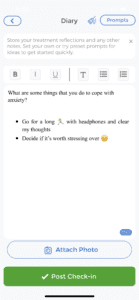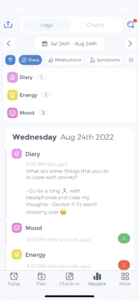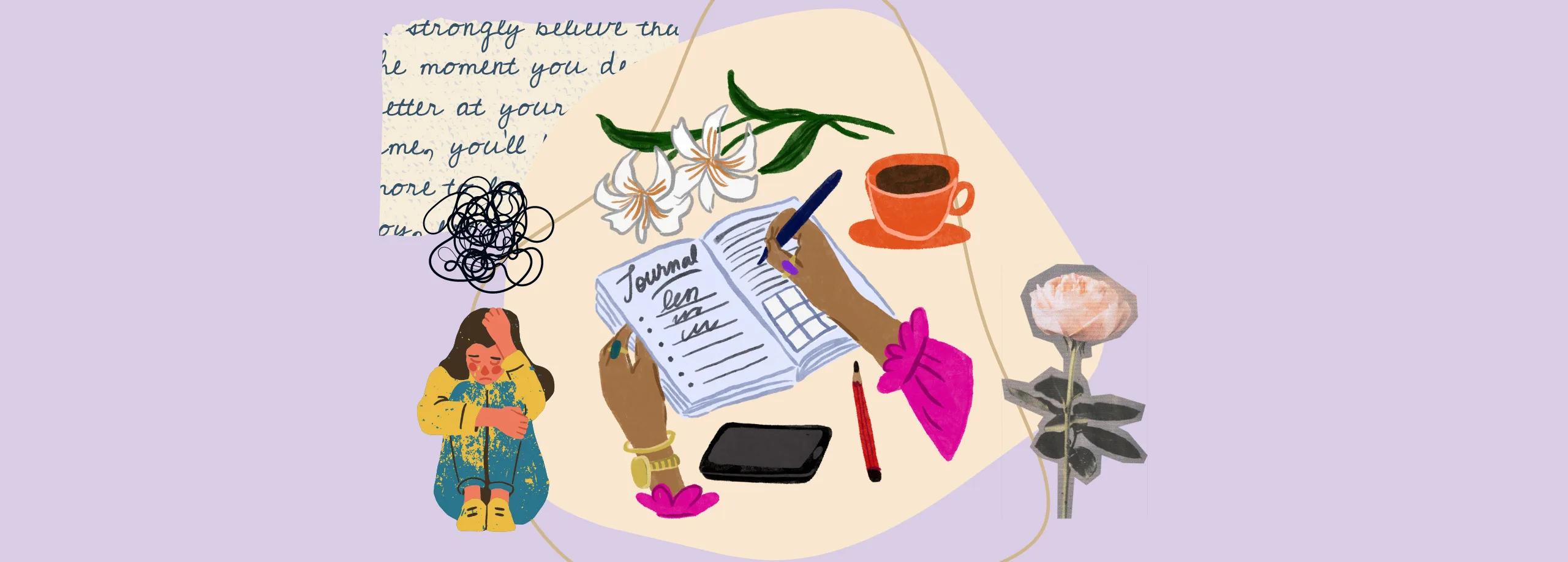 Anxiety journaling can be a helpful tool for managing anxiety. The act of writing about anxiety can help to lessen its intensity and provide a sense of control. Additionally, using our journal prompts for anxiety can help to identify anxious thoughts and patterns. Journaling about anxiety can also help to increase self-awareness and understanding of anxiety triggers.
Anxiety journaling can be a helpful tool for managing anxiety. The act of writing about anxiety can help to lessen its intensity and provide a sense of control. Additionally, using our journal prompts for anxiety can help to identify anxious thoughts and patterns. Journaling about anxiety can also help to increase self-awareness and understanding of anxiety triggers.
Table of Contents
- Brief on Anxiety
- How is anxiety managed?
- How to increase self-awareness when you have anxiety
- Why using a journal prompt during an episode is useful
- How to use CareClinic as an anxiety journaling tool
- How to easily get started with journaling for anxiety
- What are anxiety journal prompts?
- 33 Anxiety journal prompts to get you started
- 5 Anxiety Prompts related to Depression and self-care
- 10 Anxiety Prompts related to Social Anxiety and mental health
- 10 Anxiety Prompts questions related to work and finances for your bullet journal
- 5 Anxiety prompt ideas related to tests and exams to relieve stress
- 5 Writing Prompts topics related to Panic Disorders
- 5 CBT-based journaling prompts for easing anxiety
- 5 IPT-based journal prompts for treating SAD
- Fill in the blank journal prompts related to being Anxious
- “On a scale” from anxiety and depression prompts:
- Our top 5 picks of books you can try for Mental Health:
- Follow a framework for dealing with anxiety:
- When to seek professional help for anxiety:
- How will you feel after you have overcome anxiety?
- Few mantras to always remind yourself of when you have anxiety:
Brief on Anxiety
How many people suffer from anxiety?
Anxiety can affect anyone at any time in their life. It is a common problem that many people suffer through. According to the Anxiety and Depression Association of America, anxiety disorders are the most common mental illness in the United States, affecting 40 million adults. There are also many different types of anxiety disorders, including Generalized Anxiety Disorder (GAD), Social Anxiety Disorder, Panic Disorder, Separation Anxiety Disorder, and Selective Mutism among others.
What are some common symptoms of anxiety?
There are many different symptoms of anxiety. Some common symptoms include: feeling nervous, anxious, or on edge; having a sense of impending danger, panic, or doom; having an increased heart rate; sweating; trembling or shaking; feeling short of breath; feeling like you might pass out, and feeling nauseous or dizzy.
What are some common anxiety triggers?
Many different things can trigger anxiety. Some common triggers include stress at work or school, financial problems, relationship problems, health concerns, and major life changes.
Why you feel anxious or have anxiety attacks?
There are many different reasons why someone may feel anxious or have an anxiety attack. Some common reasons include genetics, environment, brain chemistry, and previous trauma or stress. Trauma or stress can also cause someone to develop post-traumatic stress disorder (PTSD), which is a type of anxiety disorder. Past experiences with anxiety may also make someone more likely to experience anxiety in the future.
How is anxiety managed?
There are many different ways to manage anxiety. Some people may choose to see a therapist or counselor to talk about their anxiety. Others may take medication prescribed by a doctor. Some people may find that journaling about their anxiety is helpful. Additionally, some people may find relief in relaxation techniques such as yoga or journaling.
How to increase self-awareness when you have anxiety
Being more aware of your thoughts, emotions, and physical sensations can help manage anxiety. One way to do this is by journaling about your anxiety. This can help you to identify anxious thoughts and patterns. Additionally, paying attention to your body and physical sensations can also help you to better understand your anxiety. For example, if you notice that your heart rate increases when you feel anxious, you can then start to pay attention to situations or thoughts that trigger this physical response. By increasing self-awareness, you can begin to understand your anxiety more and find ways to better manage it. A recent study by Katherine Schreiber states that “Regular journaling may help increase self-awareness, which is key to managing anxiety”. Katherine Schreiber is a Licensed Clinical Social Worker who specializes in anxiety disorders based out of New York City.
Why using a journal prompt during an episode is useful
Starting an anxiety journal can be as simple as finding a notebook and starting to write. It may be helpful to set aside some time each day to journal, such as first thing in the morning or before bed. Additionally, it may be helpful to come up with some prompts to get started.
There are some benefits journaling can provide, including acting as a form of cathartic release, helping to lessen the intensity of anxiety, and providing a sense of control. A release is when you get something “out of your system” by expressing it, and for many people, this can help manage anxiety. Lessening the intensity of anxiety can also be beneficial in that it can make the anxiety more manageable and less all-consuming. Lastly, gaining a sense of control over anxiety can be empowering and provide a sense of hope.
How to use CareClinic as an anxiety journaling tool
CareClinic can be a helpful tool for journaling about anxiety. The app provides prompts and questions that can help you to explore your anxiety. Additionally, CareClinic allows you to track your mood and environmental factors, which can help understand your anxiety triggers.
You can also set reminders to journal about your anxiety, which can help you to make it a regular habit. To get started using prompts with CareClinic, tap “Check-in” from the bottom navigation.
Get started by picking one of the anxiety writing prompts above, or select “Prompts” from the top menu and select any prompt or journaling style and begin writing.
Once you are done you can save your diary or journal entry by tapping “Create Check-in”, or you can press back ( < ) and continue to add other factors such as mood, blood pressure, symptoms, medications or factors such as sleep and exercises that you have engaged in that you wish to track. Once done, create the check and view your data stored in logs.
Reviewing your journal entries is a good way to see patterns in your anxiety. To do this, select “Logs” from the top menu. Here you can view all of your previous journal entries and filter them by date, mood, or any other factor that you have tracked. Reviewing your journal entries can help you to understand your anxiety better and find ways to manage it. Don’t forget to use Chart comparisons to find Correlations between different aspects of your life, such as Mood vs Medications. Remember to discuss all your findings with your psychotherapist or doctor to continue to manage and improve your treatment.
If you would like to learn more about using CareClinic for anxiety management, download the app by tapping here.
How to easily get started with journaling for anxiety
- Pick a journal. You can use a traditional notebook or an online journaling app like CareClinic.
- Set aside some time to journal each day. This can be first thing in the morning or before bed.
- Use prompts to get started (that we list below!) or simply start writing about your anxiety.
- Be honest and don’t worry about spelling or grammar. This is for you and no one else!
- Write as much or as little as you want. There is no right or wrong way to do this.
- Be patient with yourself. It may take some time to get used to journaling about your anxiety but it can be a helpful tool.
- Seek professional help if you find that your anxiety is impacting your ability to function in day-to-day life.
What are anxiety journal prompts?
Prompts are questions or topics that can help to guide your writing. When it comes to journaling about anxiety, prompts can help you to explore your thoughts and emotions. CareClinic provides a variety of anxiety prompts that can help you to get started. You can use a new daily journal prompt for your mental health.
Prompts can be useful when you are having an anxiety attack because they can help you to focus on something specific. Prompts can also help you to identify anxious thoughts and patterns. Additionally, prompts can be helpful when you are feeling stuck and don’t know what to write about.
33 Anxiety journal prompts to get you started
- What are some things that make you feel anxious?
- What are some thoughts that go through your mind when you feel anxious?
- What physical sensations do you experience when you feel anxious?
- What is your anxiety telling you?
- What are some of your biggest fears?
- What are some things that you avoid because of anxiety?
- What would it be like to live without anxiety?
- What are some things that you are anxious about right now?
- What are some things that you have anxious thoughts about regularly?
- What is the worst thing that could happen if you allow your anxiety to take over?
- What is the best thing that could happen if you face your anxiety?
- What are some things that you do to cope with anxiety?
- Are there any situations or places that make your anxiety worse?
- What are some things that make your anxiety better?
- What are some things that you worry about?
- What are some things that cause you stress?
- What are some things that trigger your anxiety?
- What are some things that you do to avoid feeling anxious?
- What are some thoughts that go through your mind when you’re trying to fall asleep but can’t?
- What are some things that you worry about when it comes to your health?
- What are some things that you worry about when it comes to your relationships?
- What are some things that you worry about when it comes to your work or school?
- What are some things that you worry about when it comes to your finances?
- What are some things that you worry about when it comes to your future?
- What are some things that you worry about when it comes to your past?
- What would happen if you didn’t have anxiety?
- What are some things that help you when you feel anxious?
- What does your perfect day look like?
- Who are the people in your life that make you feel supported?
- What are some things that you are grateful for?
- What are some things that you can do to take care of yourself when you’re feeling anxious?
- What are some things that make you feel calm and relaxed? (Try listening to meditations in CareClinic’s soundscapes screen)
- What are some things that you can do to reduce your anxiety in the long term?
For the prompts above, you do not need to answer with 1 answer for each. As an example, if the question is What would happen if you didn’t have anxiety, the answer can be more than “I would feel much better because I could freely communicate how I felt.” It could be a list, such as:
- I would be able to go on more trips with friends
- I could play more sports as I wouldn’t feel so scared
- I could focus more on schoolwork
You may feel free to go into detail for whichever point you choose to answer. Remember you can always print this page, save it as a PDF or just bookmark this page to view our list of journal prompts for anxiety.
- What are some things that make you feel depressed?
- What are some thoughts that go through your mind when you feel depressed?
- What physical sensations do you experience when you feel depressed?
- What is your depression telling you?
- What would it be like to live without depression?
- What are some things that you avoid because of depression?
- What are some things that you do to cope with depression?
- Are there any situations or places that make your depression worse?
- What are some things that make your depression better?
- What are some thoughts that go through your mind when you’re trying to fall asleep but can’t?
- What are some things that make you anxious about social situations?
- What are some thoughts that go through your mind when you feel anxious about social situations?
- What physical sensations do you experience when you feel anxious about social situations?
- What is your anxiety telling you about social situations?
- What are some things that you worry about when it comes to social situations?
- What are some things that you do to avoid feeling anxious about social situations?
- What would happen if you didn’t have anxiety about social situations?
- What are some things that help you when you feel anxious about social situations?
- Why do you think you feel anxious about social situations?
- What would it be like to not feel anxious about social situations?
- What are some things that make you anxious about work?
- What are some thoughts that go through your mind when you feel anxious about work?
- What physical sensations do you experience when you feel anxious about work?
- What is your anxiety telling you about work?
- What are some things that you worry about when it comes to working?
- What are some things that you do to avoid feeling anxious about work?
- What would happen if you didn’t have anxiety about work?
- What are some things that help you when you feel anxious about work?
- What is your perfect day at work like?
- Who are the people at work that make you feel supported?
- What are some things that make you anxious about tests and exams?
- What are some thoughts that go through your mind when you feel anxious about tests and exams?
- What physical sensations do you experience when you feel anxious about tests and exams?
- What are some things that make you anxious about school?
- What are some thoughts that go through your mind when you feel anxious about school?
- What are some things that make you anxious about having a panic attack?
- What are some thoughts that go through your mind when you feel anxious about having a panic attack?
- What are some of the physical sensations you experience during a panic attack? What can you do to help ease these sensations?
- What are some of the thoughts that go through your mind during a panic attack? What can you do to refocus your thoughts away from the negative and toward the positive?
- After a panic attack, how do you feel? What can you do to take care of yourself emotionally and mentally after an attack?
5 CBT-based journaling prompts for easing anxiety
- What are some of the negative thoughts or beliefs that you have about yourself?
- What evidence can you find to disprove these negative thoughts or beliefs?
- What would you be saying to a friend in the same situation?
- How can you reframe your thinking to be more positive and constructive?
- What action can you take to start moving in a better direction?
5 IPT-based journal prompts for treating SAD
- Describe a time when you felt particularly low or sad. What were the circumstances surrounding this event?
- Who was involved in this event? What was your role?
- How did you feel during and after this event? What were your thoughts and emotions?
- What might have been some different ways of handling this event?
- What can you do to make sure you don’t get caught in the same pattern in the future?
- I start to feel anxious when _______________ .
- My anxiety makes me feel _______________ .
- I cope with my anxiety by _______________ .
- When I am feeling anxious, I know that _______________ .
- If I didn’t have anxiety, _______________ .
“On a scale” from anxiety and depression prompts:
- On a scale from 1-10, how anxious do you feel right now? Why do you think you feel this way?
- On a scale from 1-10, how anxious were you yesterday? What do you think may have caused this?
- On a scale from 1-10, how would you rate your week so far in terms of anxiety levels? What has been causing your anxiety this week?
- On a scale from 1-10, how do you think you’ll feel tomorrow? What do you think will happen tomorrow that may cause this feeling?
- On a scale from 1-10, how anxious have you been this month? What has been the biggest trigger for your anxiety this month?
Our top 5 picks of books you can try for Mental Health:
The Anxiety and Phobia Workbook by Edmund J. Bourne.
Coles notes that anxiety and phobias can be effectively treated with the methods described in this workbook. The first step is to understand the nature of anxiety and fear, including the role that genetics, brain chemistry, and life experiences play in these conditions. Once you have a better understanding of your own personal form of anxiety or phobia, you can begin to work on specific strategies for managing and overcoming your symptoms.
These may include relaxation and breathing exercises, cognitive-behavioral techniques, exposure therapy, and medication. With perseverance and the help of this workbook, you can conquer your anxiety or phobia and live a fuller, richer life.
Rated: 5 stars on Amazon, 4 stars on Goodreads
The Dialectical Behavior Therapy Skills Workbook by Matthew McKay, Jeffrey C. Wood
Rated: 4 stars on Amazon, 4 stars on Goodreads
The Anxiety Toolkit by Alice Boyes
Rated: 4 stars on Amazon, 3 stars
Rated: 4 stars on Amazon, 3 stars on Goodreads
The Anxiety and Worry Workbook: The Cognitive Behavioral Solution by David A. Carbonell, PhD
Rated: 4 stars on Amazon, 3 stars on Goodreads
Follow a framework for dealing with anxiety:
Thoughts –> Emotions –> Physical Sensations –> Actions an example of this would be:
- I start to feel anxious when I think about my upcoming presentation.
- My anxiety makes me feel like I’m not prepared and I’m going to fail.
- I cope with my anxiety by trying to relax and think positive thoughts.
- When I am feeling anxious, I know that I can take deep breaths and try to focus on the present moment.
- If I didn’t have anxiety, I would be able to enjoy public speaking.
When to seek professional help for anxiety:
If you are struggling to cope with anxiety on your own, it may be time to seek professional help. A therapist can help you to understand and manage your anxiety in a more holistic way. If you are experiencing panic attacks or feel like your anxiety is impacting your day-to-day life, it is also important to seek professional help. Anxiety disorders can be effectively treated with therapy and medication. If you are struggling with anxiety, don’t hesitate to reach out for help.
ADAA has a National Helpline, which provides free and confidential information and resources to help people understand and manage their anxiety. The helpline can be reached at 1-888-999-ADAA (2332).
How will you feel after you have overcome anxiety?
After you have overcome anxiety, you will feel more confident and capable. You will be able to enjoy activities that you may have avoided due to anxiety. Additionally, you will likely have a better understanding of your triggers and how to cope with anxiety. Overcoming anxiety can be a challenge, but it is possible with the right support and treatment.
Few mantras to always remind yourself of when you have anxiety:
1. “I am not my anxiety.”
2. “Anxiety is a normal emotion.”
3. “I can cope with anxiety.”
4. “There are people who understand and can help me.”
5. “I am not alone in this.”
6. “I will get through this.”
7. “I am strong.”
8. “I can do this.”
9. “I am not perfect and that’s okay.”
10. “I am worthy of love and support.”
11. “I am doing the best I can.”
12. “Anxiety does not define me.”
13. “I am so much more than my anxiety.”
14. “My anxiety does not control me.”
Don’t feel bullied by your thoughts, rather take charge:
The first step is to become aware of your thoughts. Once you are aware of your thoughts, you can start to challenge them. For example, if you are thinking “I am going to fail,” you can challenge that thought by asking yourself “What evidence do I have that I am going to fail?”.
If you are thinking “I am not good enough,” you can challenge that thought by asking yourself “What evidence do I have that I am not good enough?”. It is important to remember that thoughts are just thoughts, and they do not necessarily reflect reality.
Try to come up with 3-5 evidence-based rebuttals for each of your anxious thoughts. This will help you to see that your thoughts are not accurate and that you can manage your anxiety.
CareClinic can be a helpful tool for managing anxiety. The act of writing about anxiety can help to lessen its intensity and provide a sense of control. Additionally, using anxiety prompts within the CareClinic App can help to identify anxious thoughts and patterns. Journaling about anxiety in CareClinic can also help to increase self-awareness and understanding of anxiety triggers. If you are struggling with anxiety, CareClinic can be a valuable resource.


